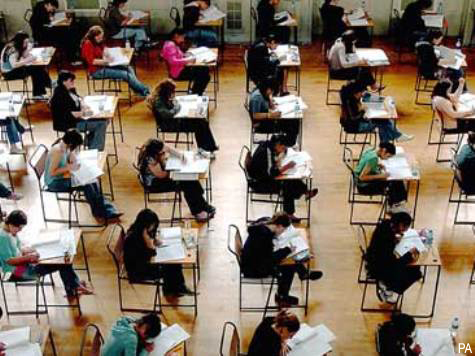Ministers have announced a series of measure to make GCSEs and A-levels (the UK’s school-leaving exams) tougher. Plans include more practical experiments in the sciences, more translation work for modern languages and a wider range of historical periods for history.
There are also plans to reintroduce “unseen” texts to encourage wider reading, and a greater emphasis will be placed on exams rather than “coursework”.
The plans come as exam regulator Ofqual announced that it would dramatically reduce the amount of coursework students do. Coursework, take-home work that counts toward the final grade, has been vulnerable to cheating, with students able to use parental and internet help.
The BBC reports that the changes will affect various core subjects, such as science, English, history and modern languages. In the science subjects, students will now have to conduct at least 12 experiments, and more mathematical knowledge will be required for physics.
English literature students will be given an “unseen text” in their exams, to encourage them to read more widely and critically, while the geography GCSE will require students to learn more about the geography of the UK.
There are also changes to the history syllabus, which has previously been criticised as “boring”, too focused on critiquing sources rather than learning historical facts, and too focused on the 20th century.
A 2012 study by think-tank Politeia condemned the standard of history teaching in England, saying it places an excessive emphasis on broad skills rather than deep knowledge of events.
The study said: “England is unusual in giving so little value to history at school. Compared with other western democracies, history counts only as a small part of our education.
“School history can be characterised as having an incoherent, fragmented, and often repetitive curriculum, and a problematic examination system.”
A more recent paper by Toby Young, for the think-tank Civitas, criticised the history curriculum’s focus on presenting students with “sources” and then getting them to detect “bias”. He quotes from a young history teacher who writes:
It did not take me long to work out why pupils are so ignorant of British history, despite spending over a year studying it… To study the Norman Conquest, pupils would re-enact the Battle of Hastings in the playground, conduct a classroom survey to create their own Domesday Book, and make motte-and-bailey castles out of cereal boxes. Medieval England would be studied through acting out the death of Thomas Becket and creating a board game to cover life as a medieval peasant. For the Industrial Revolution, pupils pitched inventions to Dragons’ Den and lessons on the British Empire culminated in the design of a commemorative plate showing whether it was or was not a ‘force for good’.
Students will now have to learn about a wider range of historical periods, and there will be a greater emphasis on the UK, although there is still no definitive word on scaling back “source work”.
Education Secretary Michael Gove said: “Our changes will make GCSEs and A-levels more ambitious, with greater stretch for the most able.”

COMMENTS
Please let us know if you're having issues with commenting.